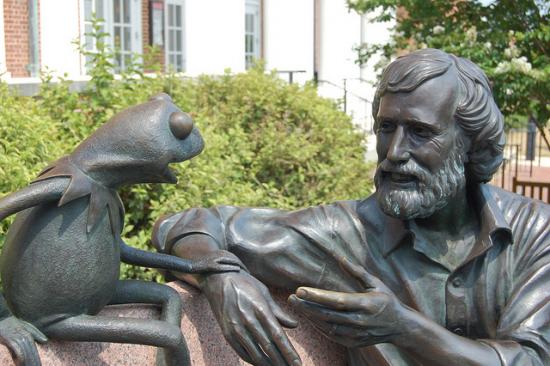
I could create an entire podcast out of the lessons I’ve learned from Jim Henson.
The beloved entertainer and puppeteer was a hero of mine as a child, and as an adult my respect for his passion, creativity and optimism only continues to grow. Not only did I learn how to read and count from “Sesame Street,” but Henson’s creations taught me the value of entertainment, the importance of friendship, the beauty of diversity, and the humor of explosions. My kids are at the age where singing puppets are of particular interest, and they’ve spent several hours watching “Sesame Street,” “The Muppet Show” and “Fraggle Rock” reruns, and I’m impressed all over again by Henson’s genius.
A few years back, I read the Henson biography by Brian Jay Jones, and it’s a great read. Not only is it a look behind the scenes of shows and movies that I hold near and dear to my heart, but it’s a glimpse at a man whose creativity and outlook helped shape who I am. And just when I thought the Muppet Man had no more lessons to teach me, I found myself mulling over something new.
Over and again, Jones talks about Henson’s unflagging patience and serenity, even in an environment where chaos regularly unfolded around him. Of particular note is the way Henson responded to kids. Even in the midst of all the craziness at work, if kids came up and asked a question, Jim didn’t shoo them away, ignore them or condescend. He treated their inquiries seriously, talked to them honestly, and showed them patience and kindness. His reason has become one of his most noteworthy quotes:
[Kids] don’t remember what you try to teach them. They remember what you are.
That’s a good reminder for an impatient father of an energetic and inquisitive children. Many are the days when my son besieges me with questions, and he grows more inquisitive as he gets older. Many are the times when I’ve sat down to read, write or watch a movie only to have Cece run up to me with a book, want to play, or need a snack or diaper change. There are many nights where I’m tired, frustrated or busy and they comes crying for my attention.
It’s easy to want to give a pat answer, teach a quick lesson or direct them out of the room and to the television — and sadly, that’s what I do more often than I’d like to admit. But I need to be reminded that my kids are not just listening to what I say — they are watching who I am. And just as they’ve found a way to parrot everything I say, they’re going to incorporate my mannerisms, reactions and values into their own life. If I want Mickey to grow up and be patient, I need to be patient with him. If I want Cece to be kind, I need to be kind. If I want them to remember that family is important, I have to show them that they’re a priority to mel. My kids won’t remember that I told them they need to be quiet when Daddy’s working or that I asked them not to climb on the dining room table (although I’ll keep asking). But they will remember if I was kind, compassionate, loving, respectful and interested in them. And those are the lessons that shape who they become.
But I think that lesson goes well beyond our relationships with our kids. It has bearing on every other relationship. So often, we want to tell people what we know, what we can do or what we believe. And while those things have their place of importance, we fail to remember that the thing that will make more of an impact is the impression they take from who we are.
Your skills and knowledge may make you an asset at the workplace, but it’s your work ethic, respect for others and humility that will cause people to remember you years later. You may be the funniest or trendiest of your friends, but it’s your hospitality, kindness and willingness to lend an ear that allows you to pick up the same conversation decades later. You may provide great financial support, be a great handyman or cook, and take the family on regular vacations — what your spouse and children will remember most is whether you were present, loving and invested in their lives. People will not always remember what you can do or what yous say; they will remember who you are.
This lesson extends to the church. As I’ve noted before, it’s not always what we say that I’m concerned with, but how we say it. You can quote the Bible verbatim, making sure you have proper context for all your quotes. You can model a pious life, steering free of any vices and giving every extra cent you have to the church. You can canvas social media with spiritual articles and quotes, and spend every extra hour you have witnessing to people and asking them if they know where they’ll go when they die. But, as Paul wrote in his famous chapter in 1 Corinthians, if it’s done without love, it’s worthless.
People don’t care what you know. They’re not going to remember your doctrines, statistics, theology or platitudes. They will, however, remember if you’re compassionate, loving, kind, patient, selfless and humble. And if they remember that, they might want to know where that comes from. That’s how lives are changed.
People will remember very little of what we say or what we try to teach them. They will, however, always remember what we are.

















